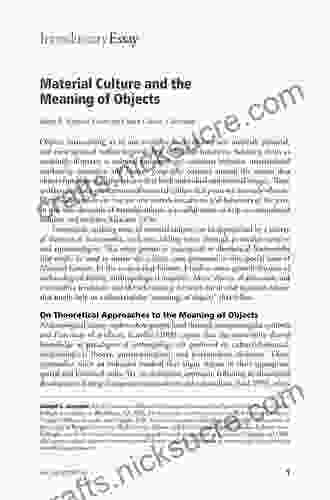Cosmetic Citizenship and Affective Capital in Brazil: The Transformative Power of Beauty in a Globalized World


In a rapidly globalizing world, where physical appearance and social media presence are increasingly intertwined, cosmetic citizenship has emerged as a new form of social recognition and belonging. Cosmetic citizenship refers to the ability of individuals to access and use cosmetic procedures to enhance their appearance and, in turn, increase their social status and economic opportunities. In Brazil, where beauty standards are heavily influenced by Western ideals, cosmetic procedures have become a widespread phenomenon, transforming the way Brazilians perceive themselves and interact with the world. This article explores the concept of cosmetic citizenship in Brazil, examining its historical roots, social implications, and the role it plays in shaping individual and collective identities.
5 out of 5
| Language | : | English |
| File size | : | 3167 KB |
| Text-to-Speech | : | Enabled |
| Screen Reader | : | Supported |
| Enhanced typesetting | : | Enabled |
| Word Wise | : | Enabled |
| Print length | : | 267 pages |
| Lending | : | Enabled |
Historical Roots of Cosmetic Citizenship in Brazil
The history of cosmetic citizenship in Brazil can be traced back to the country's colonial past, when European colonizers imposed their beauty ideals on the indigenous population. The Portuguese idealized white skin, straight hair, and European facial features, leading to a widespread sense of inferiority among Afro-Brazilian and indigenous Brazilians. This inferiority complex was perpetuated through centuries of discrimination and social exclusion, creating a deep-seated desire among marginalized groups to conform to Eurocentric beauty standards.
In the 20th century, Brazil underwent rapid urbanization and industrialization, which led to the emergence of a new middle class. This aspiring middle class sought to distance themselves from their working-class or rural roots by adopting Westernized beauty practices. Cosmetic procedures became increasingly popular as a way to achieve the desired appearance and gain access to higher social circles.
Social Implications of Cosmetic Citizenship
The rise of cosmetic citizenship in Brazil has had profound social implications. On the one hand, it has empowered individuals to take control of their appearance and pursue their desired beauty ideals. Cosmetic procedures have been shown to boost self-confidence, reduce body dissatisfaction, and improve mental health. For marginalized groups, cosmetic citizenship has provided a path to social acceptance and inclusion.
On the other hand, cosmetic citizenship has also raised concerns about the perpetuation of unrealistic beauty standards and the commodification of the body. The emphasis on physical appearance can create pressure on individuals to conform to narrow and unattainable ideals, leading to body image issues and eating disorders. The commercialization of cosmetic procedures can also lead to exploitation and unethical practices, particularly among vulnerable populations.
The Role of Affective Capital
Central to the concept of cosmetic citizenship is the notion of affective capital. Affective capital refers to the social and economic benefits that accrue to individuals who embody desired physical characteristics or who demonstrate expertise in beauty practices. In Brazil, individuals with lighter skin, straighter hair, and more European facial features are often perceived as more desirable and capable, and as a result, they enjoy greater social recognition and economic opportunities.
Cosmetic procedures can be seen as a form of affective capital accumulation, allowing individuals to acquire the physical attributes that are associated with success and social status. By enhancing their appearance, individuals can increase their perceived trustworthiness, attractiveness, and competence, which can lead to better job opportunities, promotions, and social connections.
Cosmetic Citizenship and Globalized Beauty
The phenomenon of cosmetic citizenship is not unique to Brazil but is part of a larger global trend driven by the rise of social media and the increasing interconnectedness of the world. Western beauty ideals have become increasingly globalized, and the desire to achieve these ideals has become a common aspiration across cultures. Cosmetic citizenship has emerged as a way for individuals to navigate this globalized beauty landscape and to assert their place in the social hierarchy.
In Brazil, the influence of globalized beauty standards is evident in the popularity of cosmetic procedures that aim to achieve a more Westernized appearance. Brazilian women, for example, frequently seek out hair straightening treatments, skin lightening procedures, and breast augmentations to conform to Eurocentric ideals of beauty. The pursuit of these procedures is often seen as a way to improve one's chances of success in the globalized job market and to gain recognition on social media platforms.
Cosmetic citizenship is a complex and multifaceted phenomenon that has profound implications for individuals and societies around the world. In Brazil, cosmetic procedures have become a widespread social practice, transforming the way Brazilians perceive themselves and interact with the world. While cosmetic citizenship has empowered individuals to take control of their appearance and pursue their desired beauty ideals, it has also raised concerns about the perpetuation of unrealistic beauty standards and the commodification of the body. The role of affective capital is central to understanding the social significance of cosmetic citizenship, as individuals who embody desired physical characteristics or who demonstrate expertise in beauty practices enjoy greater social recognition and economic opportunities. As the world becomes increasingly globalized and interconnected, cosmetic citizenship is likely to continue to play a significant role in shaping individual and collective identities.
5 out of 5
| Language | : | English |
| File size | : | 3167 KB |
| Text-to-Speech | : | Enabled |
| Screen Reader | : | Supported |
| Enhanced typesetting | : | Enabled |
| Word Wise | : | Enabled |
| Print length | : | 267 pages |
| Lending | : | Enabled |
Do you want to contribute by writing guest posts on this blog?
Please contact us and send us a resume of previous articles that you have written.
 Fiction
Fiction Non Fiction
Non Fiction Romance
Romance Mystery
Mystery Thriller
Thriller SciFi
SciFi Fantasy
Fantasy Horror
Horror Biography
Biography Selfhelp
Selfhelp Business
Business History
History Classics
Classics Poetry
Poetry Childrens
Childrens Young Adult
Young Adult Educational
Educational Cooking
Cooking Travel
Travel Lifestyle
Lifestyle Spirituality
Spirituality Health
Health Fitness
Fitness Technology
Technology Science
Science Arts
Arts Crafts
Crafts DIY
DIY Gardening
Gardening Petcare
Petcare O Thomas Gift
O Thomas Gift Laura Gao
Laura Gao Thubten Yeshe
Thubten Yeshe Claire Ahn
Claire Ahn Ned Johnson
Ned Johnson Brian Greene
Brian Greene Al Desetta
Al Desetta Phil Boyle
Phil Boyle G Bailey
G Bailey Stephen R Lawhead
Stephen R Lawhead Bill Mckibben
Bill Mckibben Glen Finland
Glen Finland Amby Burfoot
Amby Burfoot Colin Hunter
Colin Hunter Richard Lighthouse
Richard Lighthouse Ariana Eagleton
Ariana Eagleton Richard Martin
Richard Martin Sissy Goff
Sissy Goff Vince Kotchian
Vince Kotchian Leigh Bardugo
Leigh Bardugo Craig Timberg
Craig Timberg Sam Jarman
Sam Jarman Aaron James
Aaron James Bruce Van Brunt
Bruce Van Brunt Man Kam Lo
Man Kam Lo Mary Roach
Mary Roach Tali Edut
Tali Edut Sheila Lamb
Sheila Lamb Timothy Phelps
Timothy Phelps Stacy Eaton
Stacy Eaton Andy Couturier
Andy Couturier Abdelkader Nouiri
Abdelkader Nouiri Shannon Hale
Shannon Hale Carmen Moreno
Carmen Moreno Abhishek V R
Abhishek V R Jack Moore
Jack Moore Stephanie Zeiss
Stephanie Zeiss Dr Robert Pasahow
Dr Robert Pasahow Sarah K L Wilson
Sarah K L Wilson Aiden Thomas
Aiden Thomas Lee Sandlin
Lee Sandlin Stephanie Puglisi
Stephanie Puglisi Maureen Duffin Ward
Maureen Duffin Ward Peter Harrison
Peter Harrison Ada Calhoun
Ada Calhoun Jennifer L Hunt
Jennifer L Hunt Baba Ifa Karade
Baba Ifa Karade Farah Shabazz Ii
Farah Shabazz Ii Lindsey Ellison
Lindsey Ellison Laurence Steinberg
Laurence Steinberg Rick Sekuloski
Rick Sekuloski Barry Robinson
Barry Robinson Beth Newell
Beth Newell Miriam Forman Brunell
Miriam Forman Brunell Sean Mcmanus
Sean Mcmanus Lavinia Collins
Lavinia Collins Shuai Huang
Shuai Huang Michelle Hodkin
Michelle Hodkin Ryan Smithson
Ryan Smithson Lisa M Given
Lisa M Given Christopher Pike
Christopher Pike Adam J Rosh
Adam J Rosh Neil Oliver
Neil Oliver Tom Jackson
Tom Jackson Daphne Poltz
Daphne Poltz Taylan Hoca
Taylan Hoca Aaron Mccargo
Aaron Mccargo Stephen A Mitchell
Stephen A Mitchell Michael L Bloomquist
Michael L Bloomquist Michel Roy
Michel Roy Winston Chang
Winston Chang Chella Quint
Chella Quint Abbi Glines
Abbi Glines Jack Cavanaugh
Jack Cavanaugh Robert Allans
Robert Allans Lois G Schwoerer
Lois G Schwoerer Martha C Nussbaum
Martha C Nussbaum Adam Galinsky
Adam Galinsky Randy Walker
Randy Walker Abridged Ed Edition Kindle Edition
Abridged Ed Edition Kindle Edition Ronald Kaine
Ronald Kaine Laura Ray
Laura Ray Agustin Fuentes
Agustin Fuentes E P Marcellin
E P Marcellin Aaron Oster
Aaron Oster Stephen Gray
Stephen Gray John Taylor
John Taylor David Simon
David Simon Abigail Hing Wen
Abigail Hing Wen Zoe Hamlet Silva
Zoe Hamlet Silva Brian Hoggard
Brian Hoggard Dan Morris
Dan Morris Meg Keys
Meg Keys Dmv Test Bank
Dmv Test Bank Bathroom Readers Institute
Bathroom Readers Institute Joy Neighbors
Joy Neighbors Tamora Pierce
Tamora Pierce Caroline Kaufman
Caroline Kaufman Laura Peyton Roberts
Laura Peyton Roberts Darrin Bergman
Darrin Bergman Laurie Chaikind Mcnulty Lcsw C
Laurie Chaikind Mcnulty Lcsw C Abigail Alling
Abigail Alling Steven Alan Childress
Steven Alan Childress David G Brown
David G Brown Michael Crawley
Michael Crawley Mark Januszewski
Mark Januszewski Abigail Marshall
Abigail Marshall Israel Finkelstein
Israel Finkelstein Marc Dando
Marc Dando Charles H Kraft
Charles H Kraft Adam Enaz
Adam Enaz Devika Primic
Devika Primic Norton Juster
Norton Juster Erika Fatland
Erika Fatland Casey Robson
Casey Robson Claire Santry
Claire Santry Rose Ann Hudson
Rose Ann Hudson Alifya And Umesh Mohite
Alifya And Umesh Mohite Ron Jones
Ron Jones Jason Korol
Jason Korol Steve Roper
Steve Roper Richard Langer
Richard Langer Abraham Silberschatz
Abraham Silberschatz Scott Meyers
Scott Meyers Barry Dainton
Barry Dainton Paul Chiasson
Paul Chiasson Rania Abouzeid
Rania Abouzeid Christian Beamish
Christian Beamish Chashiree M
Chashiree M Roman Dial
Roman Dial Sarah Moore
Sarah Moore Barbara Fox
Barbara Fox James Surowiecki
James Surowiecki Ken Springer
Ken Springer Marie Cirano
Marie Cirano Brandon Neice
Brandon Neice Christopher Black
Christopher Black Emily K Neuburger
Emily K Neuburger Debbie Ford
Debbie Ford Mark Strom
Mark Strom Alicia C Simpson
Alicia C Simpson Adam Braus
Adam Braus Jay Dawes
Jay Dawes Robert Fritz
Robert Fritz Louise Pickford
Louise Pickford Ed Engle
Ed Engle Hillary Allen
Hillary Allen Amber Fox
Amber Fox Irakli Makharadze
Irakli Makharadze Adam D Scott
Adam D Scott Lin Wellford
Lin Wellford Mikki Daughtry
Mikki Daughtry Achille Rubini
Achille Rubini Al Baird
Al Baird Matt Warshaw
Matt Warshaw Jessica Hepburn
Jessica Hepburn Ian Davis
Ian Davis Phil Gaimon
Phil Gaimon Louise Thaden
Louise Thaden Jennifer Greene
Jennifer Greene Lisa Pineda
Lisa Pineda Jasna Tuta
Jasna Tuta Charles Thomas Jr
Charles Thomas Jr Achim K Krull
Achim K Krull Suzanne Corkin
Suzanne Corkin Kevin A Morrison
Kevin A Morrison David Rensin
David Rensin Deborah Beck Busis
Deborah Beck Busis Chris Worfolk
Chris Worfolk Laura Sebastian
Laura Sebastian Genius Reads
Genius Reads Ron Hotchkiss
Ron Hotchkiss Adam Kimelman
Adam Kimelman Papus
Papus Clara Shaper
Clara Shaper Abby Haight
Abby Haight Emily Suzanne Clark
Emily Suzanne Clark Richelle Mead
Richelle Mead Bobby Reyes
Bobby Reyes Brigitte Jordan
Brigitte Jordan Betsy Miller
Betsy Miller Cassandra Eason
Cassandra Eason Sally Clarkson
Sally Clarkson Bill Loguidice
Bill Loguidice Maya Lang
Maya Lang Christopher Monahan
Christopher Monahan Amber Domoradzki
Amber Domoradzki Andrew Skurka
Andrew Skurka Megan Lane
Megan Lane Sarah Luddington
Sarah Luddington Daniel Carter Beard
Daniel Carter Beard Aaron Blight
Aaron Blight Emma Crewe
Emma Crewe Gerald A Voorhees
Gerald A Voorhees Achref Hassini
Achref Hassini Melodie M Davis
Melodie M Davis Adam Boduch
Adam Boduch Curt Lader
Curt Lader Chris Jericho
Chris Jericho Eduardo Duran
Eduardo Duran Adam Lashinsky
Adam Lashinsky John Kean
John Kean Cosmas Inyang
Cosmas Inyang Pat Chargot
Pat Chargot Lynn Alley
Lynn Alley Tom Rosenbauer
Tom Rosenbauer Dan Werb
Dan Werb Peter Sagal
Peter Sagal David Warriner
David Warriner Gail Buckland
Gail Buckland Vikas Kakwani
Vikas Kakwani David Feddes
David Feddes Michael Egan
Michael Egan Abdul Foster
Abdul Foster Rex Ogle
Rex Ogle Carley Roney
Carley Roney Brad Brewer
Brad Brewer Renda Dionne Madrigal
Renda Dionne Madrigal George John Romanes
George John Romanes Abu Mussab Wajdi Akkari
Abu Mussab Wajdi Akkari Teresa Finney
Teresa Finney Ilsa J Bick
Ilsa J Bick Steve Rosenberg
Steve Rosenberg Emily J Taylor
Emily J Taylor Jennifer Ackerman
Jennifer Ackerman Douglas W Hubbard
Douglas W Hubbard Pamela Druckerman
Pamela Druckerman Barbara Natterson Horowitz
Barbara Natterson Horowitz Garo Yepremian
Garo Yepremian Carl Jones
Carl Jones Blake D Bauer
Blake D Bauer Shari Eskenas
Shari Eskenas John Caig
John Caig Jennifer Finney Boylan
Jennifer Finney Boylan Alexander Nehamas
Alexander Nehamas Ian Mcleod
Ian Mcleod Susan Zeppieri
Susan Zeppieri Tony Soper
Tony Soper Collins Kids
Collins Kids Aaron Graves
Aaron Graves Larry Carpenter
Larry Carpenter Lisa Robertson
Lisa Robertson Pearson Education
Pearson Education Og Mandino
Og Mandino M J Parisian
M J Parisian Christina Hoff Sommers
Christina Hoff Sommers Alvin Alexander
Alvin Alexander Stephen Brennan
Stephen Brennan Jacob Neumann
Jacob Neumann Adam H Balen
Adam H Balen Drew Harris
Drew Harris Benjamin Roberts
Benjamin Roberts Rob Gray
Rob Gray Vivienne Sanders
Vivienne Sanders Zoyla Arana
Zoyla Arana Gladys Chepkirui Ngetich
Gladys Chepkirui Ngetich Barbara A Lewis
Barbara A Lewis Corinne Andrews
Corinne Andrews Jennifer Shannon
Jennifer Shannon Abigail Owen
Abigail Owen Heather Lynn
Heather Lynn Tomi Adeyemi
Tomi Adeyemi Ken Retallic
Ken Retallic Gisle Solhaug
Gisle Solhaug Chuck Callaway
Chuck Callaway Charlie Barker
Charlie Barker Adam Lazarus
Adam Lazarus Michael Johnson
Michael Johnson Aaron Hahn
Aaron Hahn Charles L Byrne
Charles L Byrne Aaron Lee Johnson
Aaron Lee Johnson Judi Kesselman Turkel
Judi Kesselman Turkel Kenn Kaufman
Kenn Kaufman Lenyfer Garrido
Lenyfer Garrido Alan Robertson
Alan Robertson Natasha Preston
Natasha Preston Wayne Westcott
Wayne Westcott Axie Oh
Axie Oh Marvin Valerie Georgia
Marvin Valerie Georgia Lucio Russo
Lucio Russo Ann Frederick
Ann Frederick Erik Scott De Bie
Erik Scott De Bie Fred Fields
Fred Fields Alicia Silverstone
Alicia Silverstone Adam Freeman
Adam Freeman Kate Rope
Kate Rope Abbey Curran
Abbey Curran James Heberd
James Heberd George J Hademenos
George J Hademenos Kim Gosselin
Kim Gosselin Sheri Van Dijk
Sheri Van Dijk Gerry Donohue
Gerry Donohue Rory Miller
Rory Miller Adam Becker
Adam Becker Chiara Giuliani
Chiara Giuliani Brian L Gorman
Brian L Gorman Annie Nicholas
Annie Nicholas Kristin Berry
Kristin Berry Lisa M Schab
Lisa M Schab Irene Lewis Mccormick
Irene Lewis Mccormick Catherine Ryan Hyde
Catherine Ryan Hyde Charles C Patrick
Charles C Patrick Abby Hafer
Abby Hafer William Deresiewicz
William Deresiewicz Harley Rustad
Harley Rustad Dan Shideler
Dan Shideler Jay Ruud
Jay Ruud Abby Mcallister
Abby Mcallister Steve Griffith
Steve Griffith Gary Sakuma
Gary Sakuma Jeff Bauman
Jeff Bauman Asato Asato
Asato Asato Lillian Cumic
Lillian Cumic Elena Aguilar
Elena Aguilar Aaron J Perry
Aaron J Perry Chaz Scoggins
Chaz Scoggins Tomos Forrest
Tomos Forrest Terry Palechuk
Terry Palechuk Jimmy Houston
Jimmy Houston P S Page
P S Page Martha Gellhorn
Martha Gellhorn Andrea M Nelson Royes
Andrea M Nelson Royes Peter David
Peter David Christopher S Stewart
Christopher S Stewart Aliza Green
Aliza Green Michael N Mitchell
Michael N Mitchell Robert Reid
Robert Reid Virginia Smith Harvey
Virginia Smith Harvey Jeremy Paxman
Jeremy Paxman Kaylynn Flanders
Kaylynn Flanders Carolyn Jessop
Carolyn Jessop Lisa Heffernan
Lisa Heffernan Christopher Knight
Christopher Knight Sharon Boyd
Sharon Boyd An American Citizen
An American Citizen Jim Morekis
Jim Morekis Abigail Tucker
Abigail Tucker T L Christianson
T L Christianson Rachael Ray
Rachael Ray Arthur Atchabahian
Arthur Atchabahian Adam Koch
Adam Koch Jeremy Roenick
Jeremy Roenick Sheldon Axler
Sheldon Axler Xiuhtezcatl Martinez
Xiuhtezcatl Martinez Debbie Elicksen
Debbie Elicksen Reinette Biggs
Reinette Biggs Edward J Larson
Edward J Larson Walter Browder
Walter Browder Michael Gruenbaum
Michael Gruenbaum Dawson Church
Dawson Church Tom Migdalski
Tom Migdalski Felice Fox
Felice Fox Miranda Kenneally
Miranda Kenneally Thomas Wilson
Thomas Wilson Kathy Koch Phd
Kathy Koch Phd Jessie Hartland
Jessie Hartland John D Gordon
John D Gordon Sasha Abramsky
Sasha Abramsky Susan Walton
Susan Walton Jeremy Shinewald
Jeremy Shinewald Adam Frank
Adam Frank Mary Wong
Mary Wong Eugene H Merrill
Eugene H Merrill Gloria Atanmo
Gloria Atanmo Kirk Bailey
Kirk Bailey Sherri Granato
Sherri Granato Anthony Wilkenson
Anthony Wilkenson Nick Holt
Nick Holt Todd Graves
Todd Graves Kit Bauman
Kit Bauman Jon Butterworth
Jon Butterworth Amelia Whitmore
Amelia Whitmore Sean Lewis
Sean Lewis Liza Angela
Liza Angela Helen Scales
Helen Scales Goodman Publishing
Goodman Publishing Stephen Abbott
Stephen Abbott Elisabetta Viggiani
Elisabetta Viggiani Arthur Turrell
Arthur Turrell Al Yellon
Al Yellon Jane Gross
Jane Gross J Robert King
J Robert King Kemi Iwalesin
Kemi Iwalesin John Hancock
John Hancock Stefan Ball
Stefan Ball Allan Sand
Allan Sand Randall Hyde
Randall Hyde Joe Simpson
Joe Simpson Moon Ho Jung
Moon Ho Jung Andrew Campanella
Andrew Campanella Conrad Bauer
Conrad Bauer Jim Willis
Jim Willis Lynn E Ponton
Lynn E Ponton Paul Mclerran
Paul Mclerran Garrett Mcnamara
Garrett Mcnamara Dick Edie
Dick Edie Deborah Madison
Deborah Madison Abigail Pogrebin
Abigail Pogrebin Christophe Jaffrelot
Christophe Jaffrelot Randi Hutter Epstein
Randi Hutter Epstein Achusim Michael
Achusim Michael Matt Owens
Matt Owens Scott Butler
Scott Butler Steve Mcmenamin
Steve Mcmenamin Scott Shaw
Scott Shaw Paula Deen
Paula Deen Kayla Cottingham
Kayla Cottingham Scott Carney
Scott Carney Lucy Letcher
Lucy Letcher Gil Capps
Gil Capps Charles Fernyhough
Charles Fernyhough Scott Parsons
Scott Parsons Stuart Firestein
Stuart Firestein Sarah Maslin Nir
Sarah Maslin Nir Aaron Reed Msn Crna
Aaron Reed Msn Crna Michelle Obama
Michelle Obama Uri Bram
Uri Bram Abigail Hair
Abigail Hair Aaron Mahnke
Aaron Mahnke Vivian Gussin Paley
Vivian Gussin Paley Andy Dumas
Andy Dumas Abinash Das
Abinash Das Abby Sunderland
Abby Sunderland Tim Larkin
Tim Larkin David Lipsky
David Lipsky William Hamilton Gibson
William Hamilton Gibson Ann Mariah Cook
Ann Mariah Cook Nancy Mohrbacher
Nancy Mohrbacher Programming Languages Academy
Programming Languages Academy Barbara Decker
Barbara Decker Katrina Kahler
Katrina Kahler Linford Stutzman
Linford Stutzman Domenica Marchetti
Domenica Marchetti Gayle Forman
Gayle Forman Cornel West
Cornel West Michael Baigent
Michael Baigent Sam J Miller
Sam J Miller Kel Carpenter
Kel Carpenter R L Stine
R L Stine T L Lowery
T L Lowery Maxine Levaren
Maxine Levaren Fumio Sasaki
Fumio Sasaki Rachel Caine
Rachel Caine Tim Jarvis
Tim Jarvis Horace Kephart
Horace Kephart Paul Schneider
Paul Schneider Gregor Clark
Gregor Clark Carl Vernon
Carl Vernon Helen C Rountree
Helen C Rountree Hans C Ohanian
Hans C Ohanian Sophie Mccartney
Sophie Mccartney Rolf Mowatt Larssen
Rolf Mowatt Larssen Abbas Kazerooni
Abbas Kazerooni Jeremy Miles
Jeremy Miles Rosie Pope
Rosie Pope David Winner
David Winner Monica Sorrenson
Monica Sorrenson Aaron Reed
Aaron Reed Adam Benshea
Adam Benshea Gavin D J Harper
Gavin D J Harper Marlene Wagman Geller
Marlene Wagman Geller Tom Mccarthy
Tom Mccarthy Adam J Cox
Adam J Cox Adam Chandler
Adam Chandler Iain Highfield
Iain Highfield Lisa Latimer
Lisa Latimer Ralph Villiger
Ralph Villiger Lynn Rush
Lynn Rush Ben Cohen
Ben Cohen Sorin Dumitrascu
Sorin Dumitrascu Seth Kugel
Seth Kugel Richard Sattora
Richard Sattora Eze Ugbor
Eze Ugbor Winifred Conkling
Winifred Conkling Jenny Han
Jenny Han Linda Sarris
Linda Sarris Justin Driver
Justin Driver Abigail Melton
Abigail Melton Al Barkow
Al Barkow Phong Thong Dang
Phong Thong Dang Katie Lear
Katie Lear
Light bulbAdvertise smarter! Our strategic ad space ensures maximum exposure. Reserve your spot today!

 Cormac McCarthyDiscover the Mystical Secrets of Money Magick Wealth Rituals: Abbi Glines...
Cormac McCarthyDiscover the Mystical Secrets of Money Magick Wealth Rituals: Abbi Glines... Edwin CoxFollow ·11.7k
Edwin CoxFollow ·11.7k Russell MitchellFollow ·16.2k
Russell MitchellFollow ·16.2k Kenneth ParkerFollow ·14.1k
Kenneth ParkerFollow ·14.1k Percy Bysshe ShelleyFollow ·17.6k
Percy Bysshe ShelleyFollow ·17.6k Corey HayesFollow ·4.4k
Corey HayesFollow ·4.4k Jorge AmadoFollow ·10k
Jorge AmadoFollow ·10k Lord ByronFollow ·16.5k
Lord ByronFollow ·16.5k Owen SimmonsFollow ·12.7k
Owen SimmonsFollow ·12.7k

 Doug Price
Doug PriceTracing the Evolution of Modern Psychoanalytic Thought:...
Psychoanalysis, once considered a radical...

 Devin Ross
Devin RossThe Digital Role Playing Game Approaches To Digital Game...
These are just a few of the many...

 F. Scott Fitzgerald
F. Scott FitzgeraldHistory from Things: Essays on Material Culture
History from Things:...

 Percy Bysshe Shelley
Percy Bysshe ShelleyThe Priest Lake Girl and the Cabin of Love: A True Story...
The Murder On...

 Isaiah Powell
Isaiah PowellThe Golf Mystic: Dick Edie's Unconventional Approach to...
In the annals of golf history, the name Dick...
5 out of 5
| Language | : | English |
| File size | : | 3167 KB |
| Text-to-Speech | : | Enabled |
| Screen Reader | : | Supported |
| Enhanced typesetting | : | Enabled |
| Word Wise | : | Enabled |
| Print length | : | 267 pages |
| Lending | : | Enabled |









